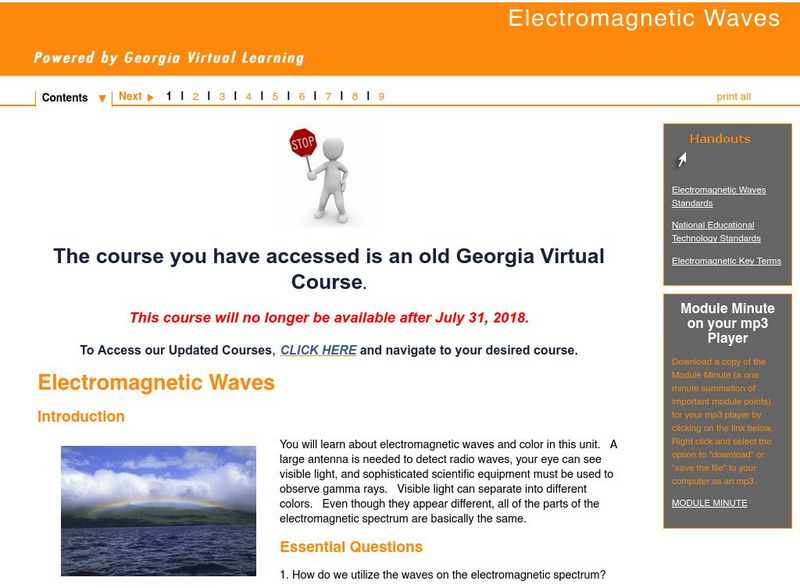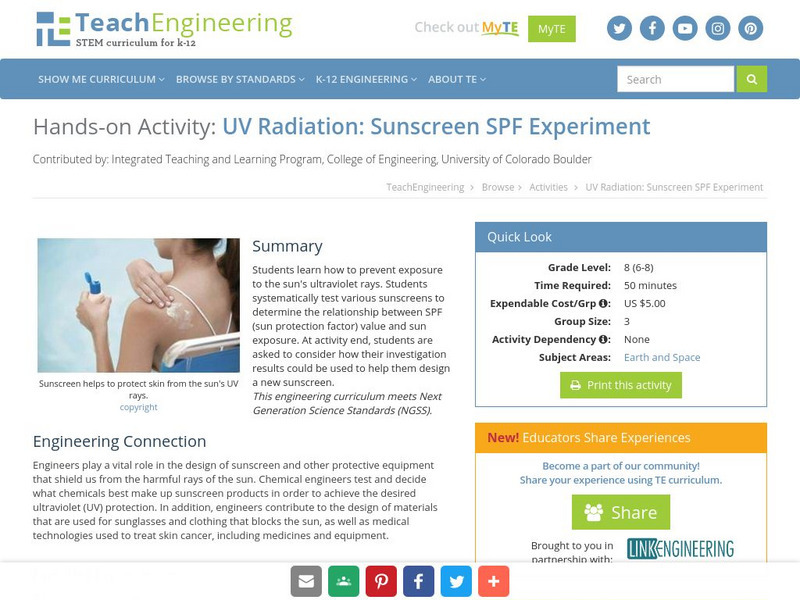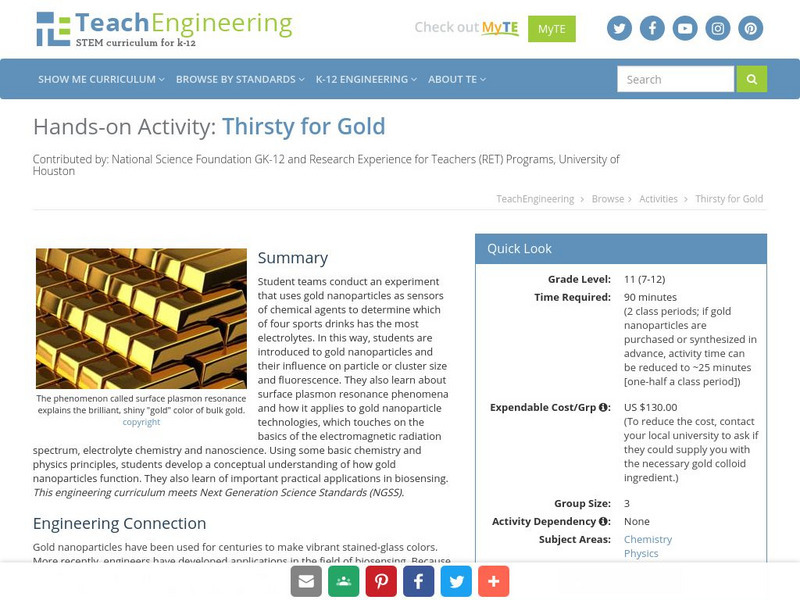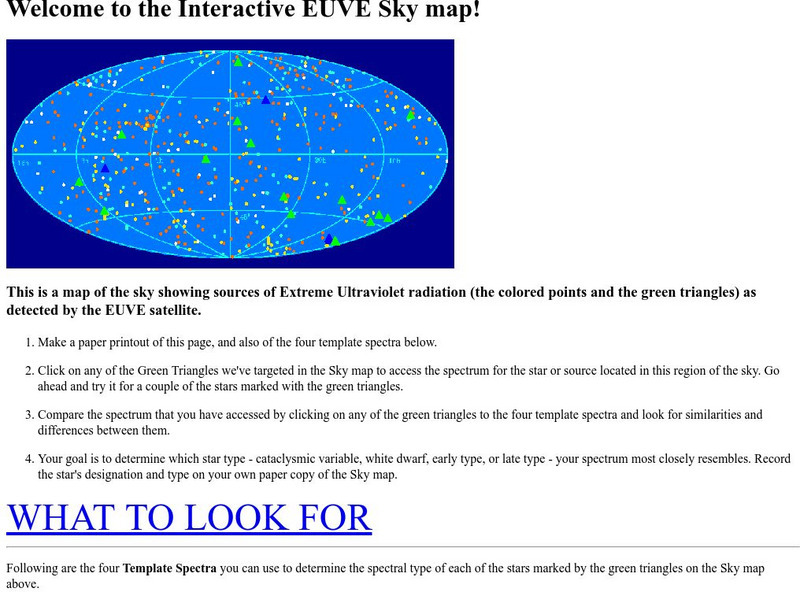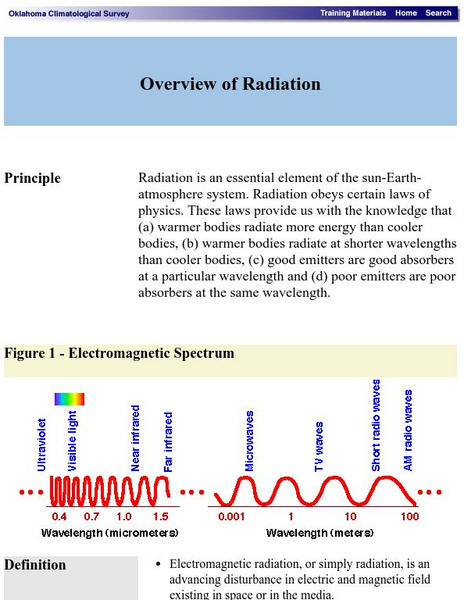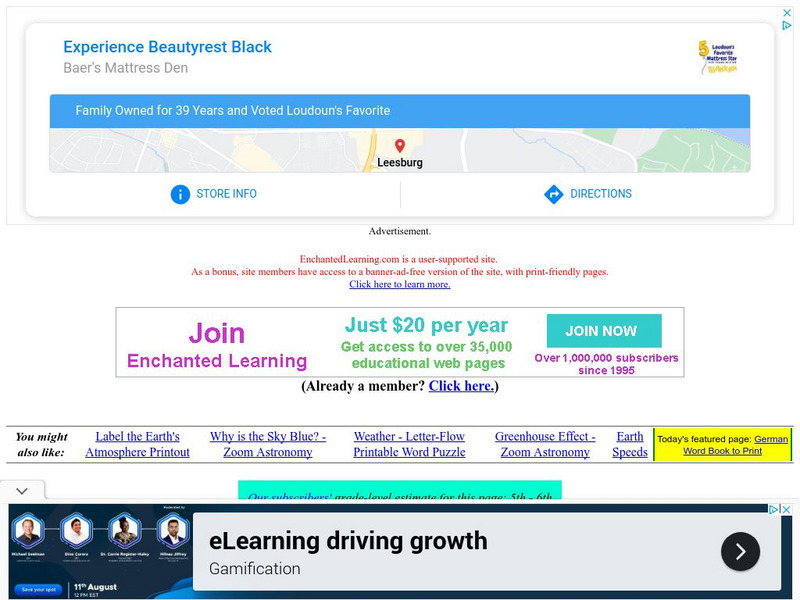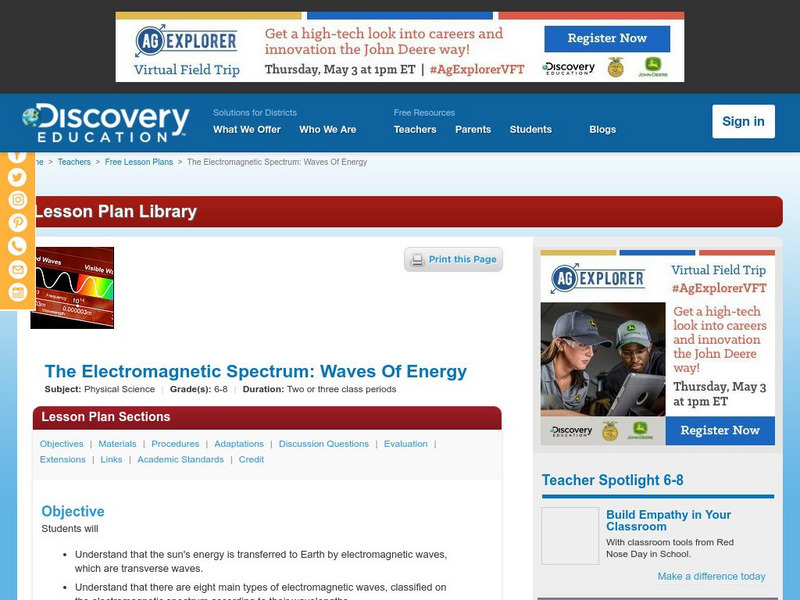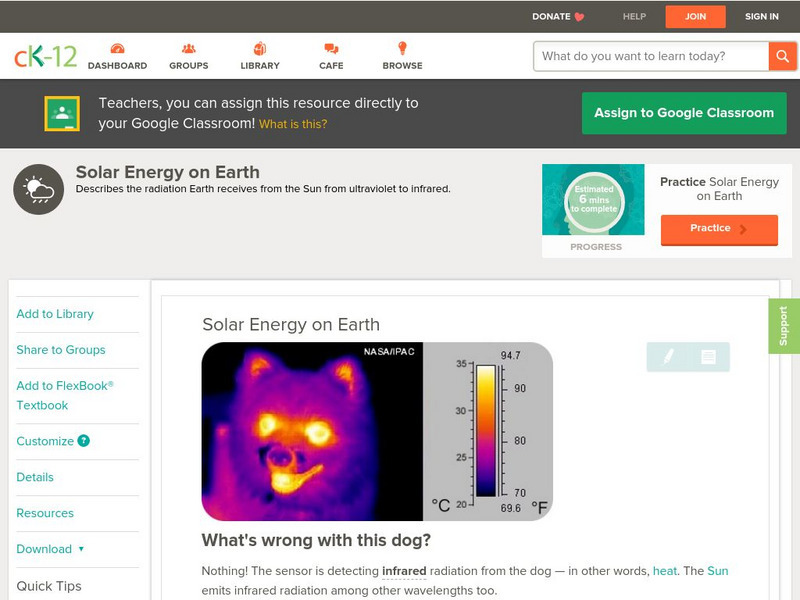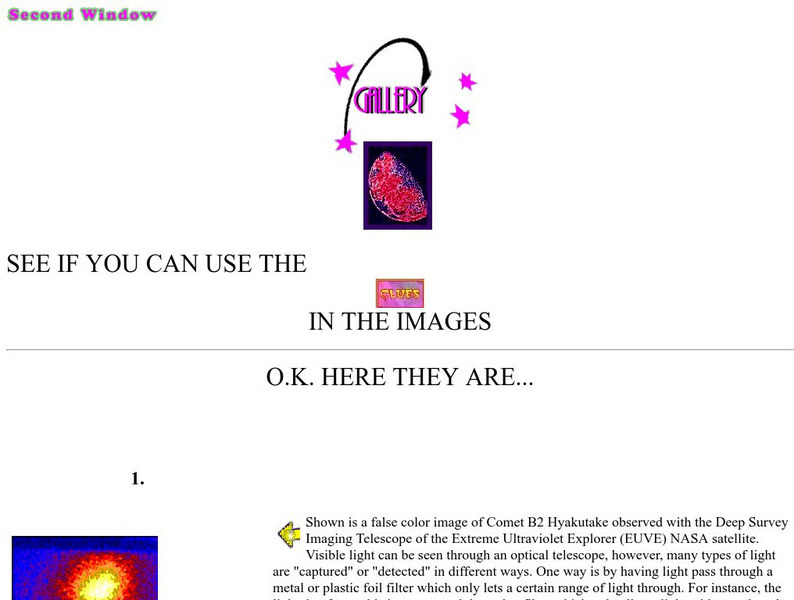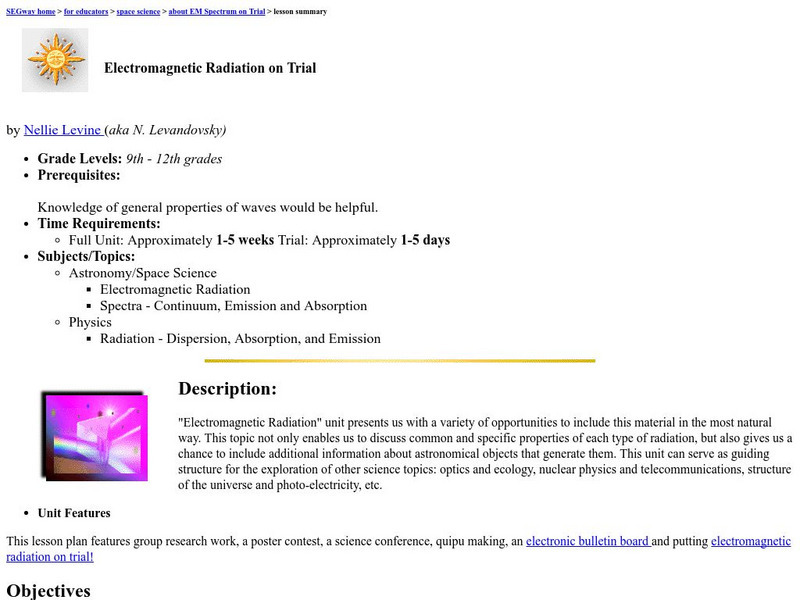Curated OER
Fun Physics You Can See
Fascinating aspects of electromagnetic radiation and its use in obtaining and transferring information are described here. Learners will find the connections to current technology interesting. Although the slides are text-heavy, they do...
Curated OER
Passport to Adventure
Students examine the function of the passport system of their country. Then they make simple accordion-fold books. Students also design and fabricate stamps with which to record information in their books. Finally, they identify and...
Curated OER
DATA ANALYSIS OF GROUND LEVEL OZONE
Sixth graders construct and interpret graphs from ozone data collected in the Phoenix area.
Curated OER
Ultraviolet Reflections
In this environment worksheet, learners distinguish between UV-A, UV-B, and UV-C radiation and explain. Then they list various explanations of the source of ozone depletion. Students also describe why an increase in smog ozone does not...
Curated OER
Nanoscience and Sunscreen
Students use the topic of sunscreen to explore the "issues related to size and scale" as energy and matter interact. They compare the visible opacity of different substances to their ability to block ultraviolet radiation.
Curated OER
Picture This!
Students compare and contrast different types of light on the electromagnetic spectrum. In this investigative lesson students create a photographic image that demonstrates the infrared, ultraviolet and polarization phenomena.
Curated OER
More About Electromagnetic Waves
In this electromagnetic waves worksheet, students compare the wavelengths of different types of electromagnetic waves. This worksheet has 5 short answer questions.
Other
Back From the Brink: Lessons Learned From Saving the Ozone Layer [Pdf]
Good site for material on the people involved in inventing CFCs and those who discovered its effects on the ozone layer.
Canada Science and Technology Museum
Canada Science and Technology Museum: Background Information for Light
Light! How do we see? What makes light? Find out everything you need to know through the Q&As on this site.
Georgia Department of Education
Ga Virtual Learning: Electromagnetic Waves
Through informational text, interactive activities, practice problems, and virtual simulations, students explore the properties of electromagnetic waves.
NASA
Nasa Space Science Data Archive: Photo Gallery: Venus
Photos of Venus' surface and cloud tops. Includes 3-D surface views. Thumbnail images load quickly and link to larger files for more detail.
TeachEngineering
Teach Engineering: It Burns!
In this activity, students learn how to prevent exposure to the Sun's harmful ultraviolet rays. Students will systematically test various sunscreens to determine the relationship between spf (sun protection factor) value and sun...
TeachEngineering
Teach Engineering: Thirsty for Gold
Student teams conduct an experiment that uses gold nanoparticles as sensors of chemical agents to determine which of four sports drinks has the most electrolytes. In this way, students are introduced to gold nanoparticles and their...
Georgia State University
Georgia State University: Hyper Physics: Color
This site from Georgia State University discusses the location of visible light on the electromagnetic spectrum. Includes the wavelength values for various colors of light within the visible light spectrum.
University of California
Interactive Extreme Ultraviolet Skymap
A map showing a view of the night sky is given; sources of extreme ultraviolet light are marked. Visitors analyze the spectrum from these parts of the sky and attempt to determine which star type the spectrum most closely resembles.
Oklahoma Mesonet
Oklahoma Climatological Survey: Overview of Radiation
This site details what radiation is, the physics of radiation, and radiative transfer as it occurs in nature. Content explores the electromagnetic spectrum, electromagnetic waves, properties of radiation, and solar radiation.
Enchanted Learning
Enchanted Learning: Zoom Astronomy: The Earth's Atmosphere
Site provides information on the Earth's atmosphere as well as offers additional information about Earth.
Discovery Education
Discovery Education: The Em Spectrum: Waves of Energy
Students are introduced to the electromagnetic spectrum through this group research activity. Each group investigates a different wavelength range within the em spectrum and reports back to class. Discussion ideas also included.
CK-12 Foundation
Ck 12: Earth Science: Solar Energy on Earth
[Free Registration/Login may be required to access all resource tools.] A breakdown of the types of energy that Earth receives from the sun.
University Corporation for Atmospheric Research
Ucar: Learn: The Greenhouse Effect
A detailed overview of the greenhouse effect, with explanations about Earth's atmosphere gases referred to as greenhouse gases, and the factors that influence the heat-trapping ability of a greenhouse. All information is reinforced...
NASA
Electromagnetic Spectrum: Ultraviolet Waves
Ultraviolet (UV) light has shorter wavelengths than visible light. Though these waves are invisible to the human eye, some insects can see them. The specific wavelength values are given. Uses and applications of these waves are explained.
Lawrence Berkeley National Laboratory
Berkeley Lab: University of California: Electromagnetic Radiation
This page defines electromagnetic radiation. Included are links to more information.
University of California
Center for Science Education: Gallery
A gallery of astronomy images which depict galaxies, comets, the moon, planets, nebulae, supernovae as seen in various regions of the electromagnetic spectrum. Each image in the gallery is described. Fascinating!
University of California
Center Science Edu.: Electromagnetic Radiation on Trial
Here is a 1-5 day unit on electromagnetic radiation that features a teacher guide and student activities with extensions.


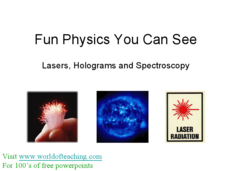



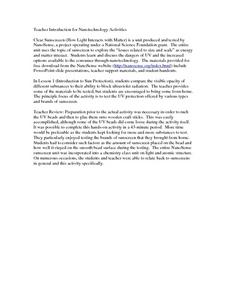


![Back From the Brink: Lessons Learned From Saving the Ozone Layer [Pdf] Primary Back From the Brink: Lessons Learned From Saving the Ozone Layer [Pdf] Primary](https://d15y2dacu3jp90.cloudfront.net/images/attachment_defaults/resource/large/FPO-knovation.png)
